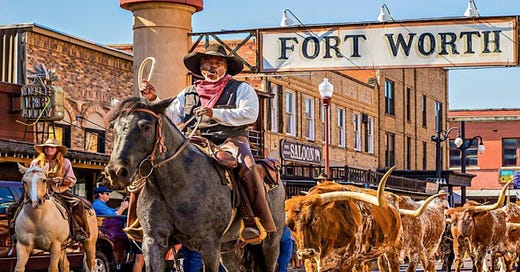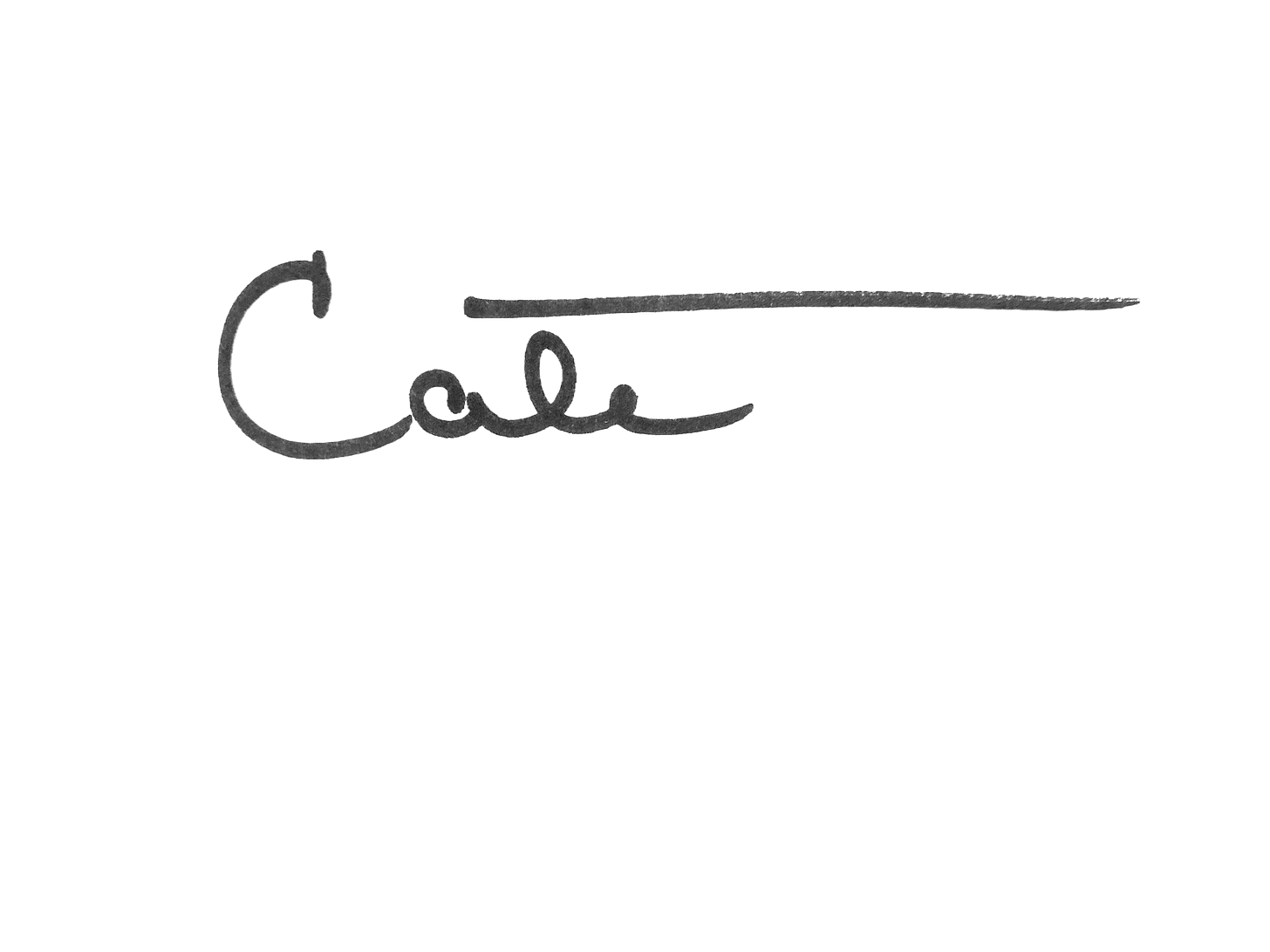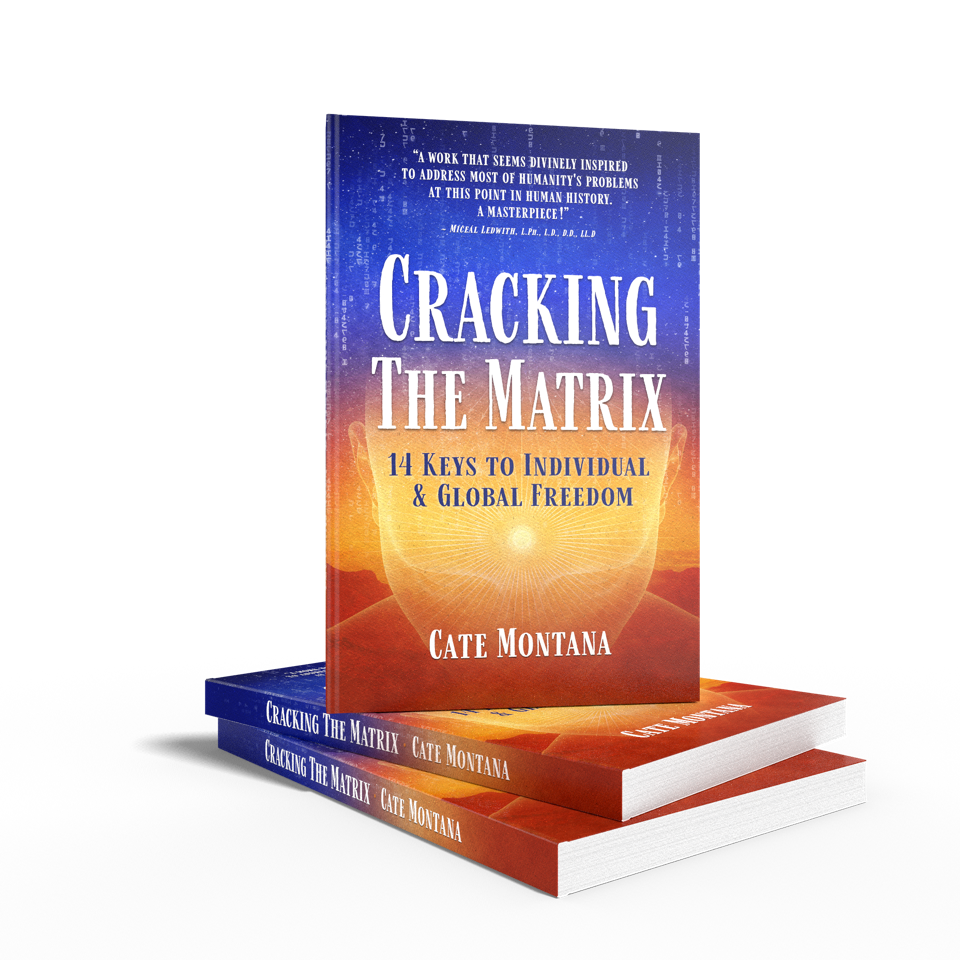I looked for an image to go with the title of this essay and there weren't any. I mean, what does worth look like anyway?
When I Googled "worth" and "images," hundreds of pictures of piles of money and gold came up, along with encouraging aphorisms about not being discouraged if others don't see your worth. Hmmm.
With no meaningful images to illustrate this week’s contemplations, I figured a shot of the Fort Worth Stock Yard Parade would do as well as anything else.
After all, human beings have, for a very long time, been lumped into the commodities and "resources" category and monetized. So … it fits.
Sad. But true.
Strange assessment
Nowadays, worth seems mostly to be about accounting, quality, valuation, cost benefit ratios, and price—a defining lens that is equally applied to assessing deodorants, real estate investments, automobiles, and human beings. So, I wasn't surprised when I ran across the following quote from a recent Substack article by John Leake titled "How Did the West Become So Stupid?"
"Money is one of the primary measures of value in any society, perhaps the primary one, the principal repository of value. As such, money is a central source of stability, continuity, and coherence in any community."
I thought sure Leake was going to directly link the West's decline into stupidity to this statement. But he did not. Instead, he talked about inflation and the West's carelessness with money—citing the disastrous Bud Lite campaign with transgender TikTok sensation Dylan Mulvaney putting Americans out of work.
When I tried to steer the conversation towards what I considered a more um ... valuable direction, weighing in with the following comment, nobody paid it any mind.
"It would seem the beginnings of the fall into stupidity happened when human beings stopped acting, choosing, and creating from the place of valuing life itself above all else—respecting ALL life rather than commoditizing it as a resource. When we begin to treat money and material objects as if the "principal repository of value" lies in them, we have lost touch with reality ... and our very souls."
I wasn't denying that money is important. And I wasn't saying that money doesn't provide social structure and cohesion. I was trying to point out the insanity of believing that money is "the principal repository of value."
But no one got it.
Which makes me wonder, maybe I'm the one not "getting" it?
Comparison
Etymologically the word "worth" comes from the Old English noun "weorþ," meaning "significant, valuable, valued, appreciated, highly thought-of, deserving, meriting; honorable, noble, of high rank; etc."
But significant compared to what? Valued and deserving compared to whom?
When did we first start setting values and making value-based comparisons? And who decides what/who is on which side of the merit coin? Isn't worth totally a matter of individual perspective?
Back in the Younger Dryas Period 12,000 years ago when the ice was melting, if a mud and ice avalanche threatened the encampment, who got pulled out of harm's way first? Children most likely.
Protecting the young is a given. And although children are of inestimable value to a tribe, rescuing children is not a value-based action. It’s a matter of life acting out of its own intelligence. An intelligence that supersedes intellect and comparative value. In the face of an avalanche, a saber-toothed tiger, or a guided missile, pure life instinct guides adults of both sexes to protect the young.
But what about the tribe's aged shaman? The crippled story keeper? The wounded hunter?
What would the childless mate of the wounded hunter do? Wouldn't s/he grab him or her and to heck with the kids? Isn't it also an instinctive matter to save what/who we personally value/love most?
And isn’t value also situational?
If the tribe is starving, surely the valued hunter—even though wounded—should be rescued? Or the shaman. Right? But who makes these kinds of judgment calls? Is worth based on a person's ability to help the tribe survive? Are we back to Darwin? And what about the crippled storyteller who makes those cold evenings huddled around the campfire more bearable and pleasant for everyone, young and old alike? The person who helps make survival worth it in the first place?
Losing track
I don't know why this question of worth is so "up" for me. Maybe it's because I don't have an answer to the question "What is your life worth?"
It would seem off the top of my head that "everything ... my life is worth everything" would be a suitable reply. But is that true? Is my life worth sacrificing one other person? Five other people? The whole planet? Of course not ... although I suppose some people might be so frightened of death they would sacrifice the whole planet to save their skins.
I think maybe we've gotten off the rails by asking the question in the first place?
Learning to compare one person’s value to another’s, suddenly the young fertile female becomes more valuable than the barren crone ... unless, of course, the crone is a great medicine woman. The compassionate genius scientist is worth more than the poor schmuck with an 8th grade education and an asshole attitude. The guy who comes and takes the garbage away is less valuable than the Wallstreet investment banker. The King is worth more than the duke, who is worth more than a knight, who is worth more than a landowner, who is worth more than a merchant, who is worth more than a common laborer, who is worth more than the slave.
When and where and why did we come up with this system of judgment?
I just watched the 2021 version of the epic film Dune directed by Denis Villeneuve. In one scene Duke Leto Atreides doesn't hesitate for a moment putting his own life and that of his son at risk, racing to the rescue of 21 spice miners. (Not coriander. Spice as in interstellar navigation tool.) Workers threatened by the gargantuan sand worms of the planet Dune.
A duke risking life and limb for "common" men? Dirty-faced, illiterate workers?
Many men and women of high rank wouldn't even think to waste their time ordering a rescue mission let alone risking life and limb themselves. "Let them eat cake," and "Oh, bad luck for them," and all that.
We look at Leto's action and call it "noble" because it reveals the Duke's character. Which is egalitarian. His actions roar:
My life is no more valuable than another's life. Rank doesn't matter. Education doesn't matter. Cleanliness doesn't matter.
My life is no more valuable than another's. Therefore I will risk it for others.
And then people elevate Leto and esteem him above others for acting this way.
Oh my. The irony.
Back to money
I don't know where the institution of money came from. Sure, we've all heard the story about how money was invented because it’s more convenient than barter, and how some tribes used shells and feathers for coins etc.
But here's the thing. With the introduction of money, the concept of "fixed value" came into being. (Yes, okay, I'm not allowing for inflation etc. But just go with me for a moment.)
Barter has a fluidity to it based in moment-to-moment living conditions and individual needs. A gallon of my cow's milk is worth berries if I'm in the mood for berries. Wool for a sweater if I'm cold. Medicine from the shaman if my kid is sick.
If berries are plentiful this year, I'll probably get more berries for my gallon of milk than I did last year when there was too much rain and berries were in short supply. It's just a natural commodity flow. Nobody is trying to wring the last berry out of a situation. The whole system is dynamic and alive and ... human.
There's no definitive question being asked: "What is something worth?" With a final stamp that says X is worth Y compared to Z.
But with the introduction of money and it's rapid evolution as "the principal repository of value," that's the singular question that arises in everyone's minds, eventually, about everything. And when we started applying the question to human beings … well, you "got what you paid for." The old, the slow, the stupid, the weak, went cheap. The beautiful, the fertile, the strong, the educated went to the highest bidder.
I'm not saying money is evil or anything even close. I'm just in deep question mode. And the whole "worth" question currently has me stumped.
Maybe it has to do with a confusion between value and love?
Reading back over this essay, the line “Isn't it also an instinctive matter to save what/who we personally value/love most?” jumped out at me. The fact that I automatically lumped value/love together as if they were the same thing is rather breathtaking, now that I see that I’ve done it.
They’re NOT the same thing. But I —and most other people—apparently now see life filtered through the monetized lens that says they’re the same.
By placing a monetary value upon a living being—the courts mandating a $9.2 million compensatory payment to the widow whose husband died after taking a poorly-tested prescribed pharmaceutical product, for example—we’ve got the whole thing mixed up.
“For the love of money is the root of all evil: which while some coveted after, they have erred from the faith, and pierced themselves through with many sorrows.” 1 Timothy 6:10 KJV
Playing the worth game, we have indeed pierced ourselves with many sorrows.
Thank you for bearing with me today on this journey of many question marks and very few answers.
Love and much aloha ~
Check out the book:
Cracking the Matrix: 14 Keys to Individual & Global Freedom
For thousands of years, every culture on Earth has described a hostile, invisible Intelligence bedeviling humanity, dragging us down. The Archons, AshShaytān, wetiko, windingo, e'epa, antimimos, Satan ... the names are legion.
Cracking the Matrix explores the astounding history and nature of what humanity has erroneously labeled "evil" on this planet, helping people finally see the very real, negative, interdimensional influence that exists behind historic and current global events and our social decline.
The book outlines how to break free of this Force's ancient controlling agenda and how people can stand up in the power of their true spiritual nature, ready to create the New Heaven and the New Earth that have so long been prophesied.
About Cate Montana
A professional journalist specializing in alternative medicine and health, Cate is the author of several other books, including Unearthing Venus: My Search for the Woman Within [Watkins 2013], and The E Word, Ego Enlightenment & Other Essentials [Atria 2017], and a spiritual novel titled Apollo & Me. She has a master’s degree in psychology, and is a highly informative and compelling speaker and guest on radio and TV shows and podcasts. She is very grateful to be able to say she lives in Hawaii.
For more information www.catemontana.com








We're all materialists, it's just that some of us are more materialistic than others. So even though "man does not live by bread alone", we all need some bread to live by but what else do we need?
There's a hierarchy of needs ofcourse and these aren't all material needs but even our principles ultimately aid us materially. We need and should value principles, which are an abstraction until they bear fruit one way or the other, good or bad.
What is worth? That's at least as hard a question as "what is truth"? There's a poem by Bukowski where he says that death wants more death,for whatever that's worth. Maybe we should value nothing and maybe we should value everything. After all, life wants more life too!
"Playing the worth game, we have indeed pierced ourselves with many sorrows."
All part of a distorted and captured world, quickly collapsing. I think the question of worth may be 'up' because we will be grappling with it very soon - collectively.
Layers are coming off, and their attending identities, which came about in order to adjust to a slave system.
I look to Nature - which we're clearly part of - and I don't see questions of worth burdening anything. The distorted world itself created the conundrum maybe? Worth must be weaved into our very existence, like love. Beings of love have no quantifiable measurement. They just are - they are worth. The more we deepen into our natures, the more love, the more worth comes into being.
Or something like that. :-) Appreciate the reflection.